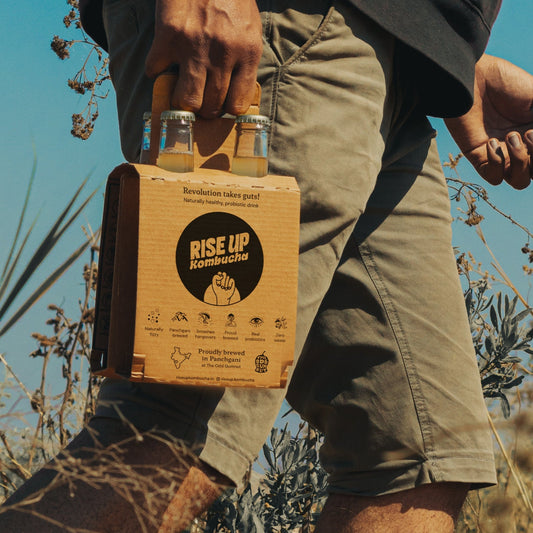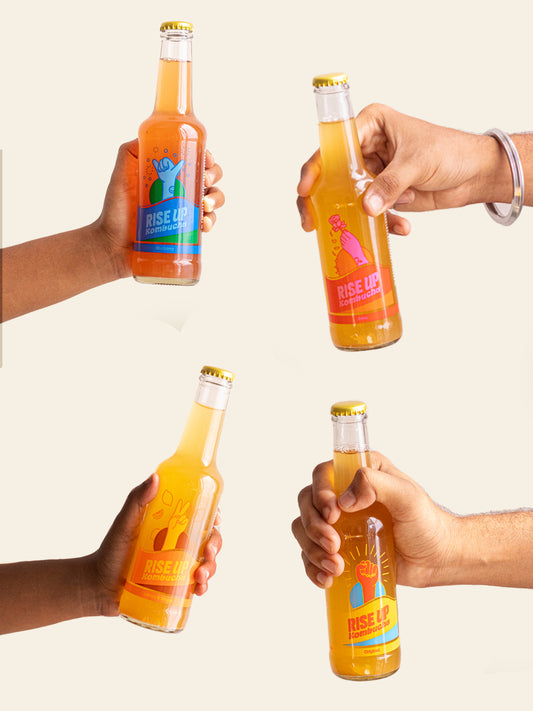Did you know that all (natural) vinegar is the destination of a fermentation process? It is always the process of yeast consuming sugar in an aerobic fermentation and eventuating as acidic. Apple cider vinegar is made from apple skins & their natural yeast, which feed on sugar. Just like apple cider vinegar, kombucha vinegar is a natural result of fermentation and is a delicious, probiotic multi-use product.
Kombucha is a green & black tea sweetened with sugar and fermented by a SCOBY (symbiotic culture of bacteria and yeast). As it ferments, sugars get consumed and transformed. The longer the fermentation time, the more sour the brew becomes because the yeast & bacteria continues to consume sugar and convert it into a range of organic acids, including lactic acid. At full maturity, if the kombucha is left to ferment long enough to consume all the sugar, it is vinegar.
KOMBUCHA VINEGAR HAS MANY USES!
Zero Waste Laundry Detergent. Those of who have taken our Natural Home & Beauty Course already know this solution! Vinegar has some great stain removing, odor removing, cleansing properties and we use it in our greywater-safe laundry detergent. We mix it up 1 liter at a time in this ratio: reetha (soapnut) liquid - 750 ml, bioenzyme - 100 ml, and kombucha vinegar - 150 ml. When it ready to wash, we take 200-300 ml of the mix and add a big spoonful of baking soda. The mix bubbles up like your 6th grade volcano experiment! It cleans brilliantly! All DIY, natural, safe, and super inexpensive.
Hair Rinse. Kombucha's naturally low-pH matches the low pH of our scalp and acts as a very gentle rinse for soft, shiny hair. Use it after washing (with reetha, shikakai or chickpea flour) as a conditioning rinse. Or, if you are off using shampoo at all, use this a rinse to clean the scalp and soften the hair. Pretty awesome.
Infused Herbal Vinegar for the Kitchen. This vinegar is super tasty! Makes a mean salad dressing with dijon mustard and olive oil. Kick up your kitchen skills a notch by infusing kombucha vinegar with any herbs or spices. Infuse in a sealed jar in a dark place for 2-3 weeks, strain and use! Some of our favorites are to use herbs like sage, thyme, oregano, and rosemary, lemon zest, garlic, onions, and chilies. Yummm.
Homemade Probiotic Ketchup! What is better than ketchup with a weekend breakfast? Instead of buying ketchup loaded with extra sugar, preservatives and red coloring, learning to make your own is a breeze. It's delicious and zero-waste. Here is the recipe we love! Originally from Hannah Crum, author of The Big Book of Kombucha.
Mix together the following:
- 12 oz tomato paste
- 1/4 c sugar
- 2 tsp jaggery
- 1/2 tsp salt
- 1/2-1 c kombucha vinegar (depends on the consistency you want)
Quick Pickles: While we do most of our pickling in the traditional fermented form (which y'all can learn here), where the sourness comes from the presence of lactic acid bacteria build up spontaneously occurring by adding a brine to veggies, we do make a some damn delicious cucumber quick pickles with kombucha vinegar. Here you are taking advantage of the fact the your vinegar is already super charged with healthy probiotics. These pickles are as simple as slicing some cucumbers (but you could also use zucchini, beetroot, onions, so many things!) and packing them in a jar with some dill or caraway, a pinch of salt, a couple crushed garlic cloves and topping the whole jar full with kombucha vinegar. Put that jar straight in the fridge and they are ready after 24 hours. Crispy, tangy and delicious!
While you are waiting for us to load up the online shop with our quality vinegar, consider making your own from fruit scraps. Our friends over at Herbalists Without Borders in Tasmania, Australia have this handy 9 minute tutorial!







